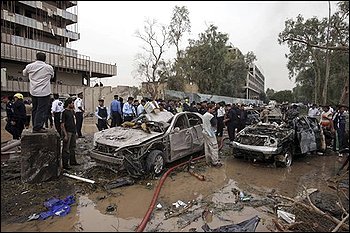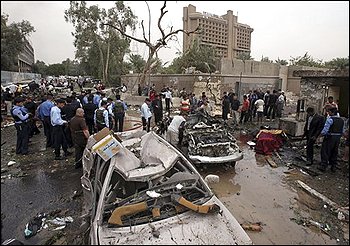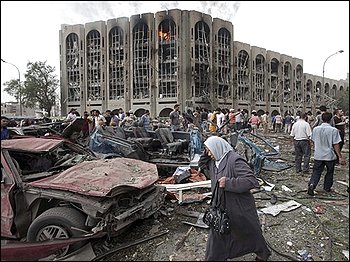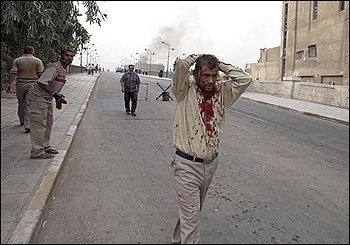Scores killed, at least 500 wounded in bomb attacks in Baghdad


|
Discussion Policy
Comments that include profanity or personal attacks or other
inappropriate comments or material will be removed from the site.
Additionally, entries that are unsigned or contain "signatures" by
someone other than the actual author will be removed. Finally, we will
take steps to block users who violate any of our posting standards,
terms of use or privacy policies or any other policies governing this
site. Please review the full rules governing commentaries and discussions. You are fully responsible for the content that you post.
|
BAGHDAD -- Twin car bombs targeted two government buildings in downtown Baghdad Sunday, wrecking pillars of the state's authority and cutting like a scythe through snarled traffic during the morning rush hour. The government said at least 132 people were killed and 520 wounded in one of the worst attacks in Baghdad.
The first bomb struck an intersection near the Justice Ministry and the Ministry of Municipalities and Public Works at around 10:15 a.m. on the first day of the Iraqi work week, when streets are always more crowded. Less than a minute later, a second blast targeted the Baghdad provincial headquarters, draped in a sign heralding its renovation.
The bombings bore the hallmarks of an attack Aug. 19 that targeted the Finance and Foreign Ministries, also killing more than 100 people. Unlike the carnage unleashed by attacks in crowded mosques, restaurants and markets, aimed at igniting sectarian strife, these blasts appeared to rely on a distinct political calculus, designed to undermine faith in the government of Prime Minister Nouri al-Maliki, who has staked his political future on restoring a semblance of security to the war-wrecked country.
"This is part of the struggle over power in Iraq, and Iraqis will have to sacrifice themselves for it," said Mohammed al-Rubai, an opponent of Maliki who serves as a member of the Baghdad provincial council. "Everyone in charge shares responsibility."
Hours after the attack, Maliki visited the scene. As in August, he blamed members of Saddam Hussein's Baath Party and the Sunni insurgent group al-Qaeda in Iraq.
"The cowardly acts of terrorism, which occurred today, must not weaken the resolution of Iraqis to continue their journey and to fight the followers of the fallen regime, the Baathists and al-Qaeda," he said in a statement released by his office. The culprits, he added, "have their black hands stained by the blood of the Iraqi people."
The blasts, which the Interior Ministry said were carried out by suicide bombers, detonated under a pale gray sky, shattering windows more than a mile away. Broken water mains sent water coursing through the street, strewn with debris. Pools of water mixed with blood gathered along the curbs, ashened detritus floating on the surface.
Cars caught in traffic jams were turned into tombs, the bodies of passengers incinerated inside. The smell of diesel mixed with the stench of burning flesh.
"Bodies were hurled into the air," said Mohammed Fadhil, a 19-year-old bystander. "I saw women and children cut in half." He looked down at a curb smeared with blood. "What's the sin that those people commited? They are so innocent."
Ali Hassan, an employee at the provincial headquarters, said the building was filled with women with their children seeking compensation for past terrorist actions.
"Now they've become the victims again," he said.
The cacophony of destruction ensued after the blasts. The thud of helicopters intersected with the noon call to prayer, as rescue workers, shouting at each other, frantically pulled charred bodies from crumpled cars. Broken glass littered the sidewalk like ice in a hailstorm, scraping under the shuffling of feet. Bulldozers dragged the carcasses of vehicle across the pavement, then deposited them randomly.






 Why Do I Have to Log In Again?
Why Do I Have to Log In Again? Discussion Policy
Discussion Policy


